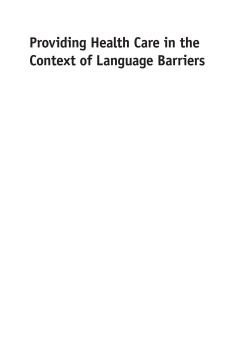
BOOK
Providing Health Care in the Context of Language Barriers
Elizabeth A. Jacobs | Lisa C. Diamond
(2017)
Additional Information
Book Details
Abstract
Global migration continues to increase, and with it comes increasing linguistic diversity. This presents obvious challenges for both healthcare provider and patient, and the chapters in this volume represent a range of international perspectives on language barriers in health care. A variety of factors influence the best ways of approaching and overcoming these language barriers, including cultural, geographical, political and practical considerations, and as a result a range of approaches and solutions are suggested and discussed. The authors in this volume discuss a wide range of countries and languages, and cover issues that will be familiar to all healthcare practitioners, including the role of informal interpreters, interpreting in a clinical setting, bilingual healthcare practitioners and working with languages with comparatively small numbers of speakers.
Finally – all the best advice on effective communication in the context of language barriers, all in one place! Health professionals and policymakers alike will find this a useful resource for providing high quality care to diverse populations. Each chapter, authored by leading experts, offers practical guidance for doing just that.
What comes out of this research is a series of recommendations which are of particular interest. It was concluded that not only should more adequate language support be provided for the local patient demographic, but also that language awareness and an understanding of the concept of bilingualism should be introduced into healthcare education in Wales.
Ros Wright
Elizabeth A. Jacobs is Professor of Medicine and Population Health Sciences and Associate Vice Chair for Health Services Research at the University of Madison-Wisconsin, USA.
Lisa C. Diamond is Assistant Member/Assistant Attending at Memorial Sloan Kettering Cancer Center, Immigrant Health and Cancer Disparities Service, New York, USA.
This book is a 'must-read' for anyone interested in improving health care across linguistic barriers. In a rich array of chapters written by knowledgeable researchers and practitioners from multiple countries, Drs. Jacobs and Diamond have created a valuable resource that provides both theoretical and practical advice. A unique treasure!
Table of Contents
| Section Title | Page | Action | Price |
|---|---|---|---|
| Contents | v | ||
| Contributors | vii | ||
| Introduction | xv | ||
| 1 The Drivers of Demandfor Language Services in Health Care | 1 | ||
| 2 Three Critical Steps to Enhance Delivery of Language Services in Health Care | 20 | ||
| 3 Conceptualizing Bilingual Health Communication: A Theory-based Approach to Interpreter-mediated Medical Encounters | 35 | ||
| 4 Challenges to and Recommendations for Working with a Community Interpreter in Mental Health: A Canadian Perspective | 56 | ||
| 5 Toward a Theoretical Framework of Informal Interpreting in Health Care: Explaining the Effects of Role Conflict on Control, Power and Trust in Interpreter-mediated Encounters | 71 | ||
| 6 Understanding the Advantages and Disadvantages of the Diversity of Approaches to Overcoming Language Barriers in Medical Encounters | 93 | ||
| 7 Language Concordance Between Limited English Proficient Patients and Their Clinicians | 102 | ||
| 8 Breaking the Silence: Identifying the Needs of Bilingual Speakers in Health Care | 116 | ||
| 9 Engaging the Community to Develop Solutions for Languages of Lesser Diffusion | 149 | ||
| 10 Chinese Voices: Improving Access to Health Care | 170 | ||
| 11 A New Zealand Perspective on Providing Health Care for Patients with Limited English Proficiency | 190 | ||
| 12 Toward a New Approach for Culturally and Linguistically Responsive Health Care: A Case Study of Developments in Victoria, Australia | 211 | ||
| Epilogue | 235 | ||
| Glossary | 236 | ||
| Index | 239 |
